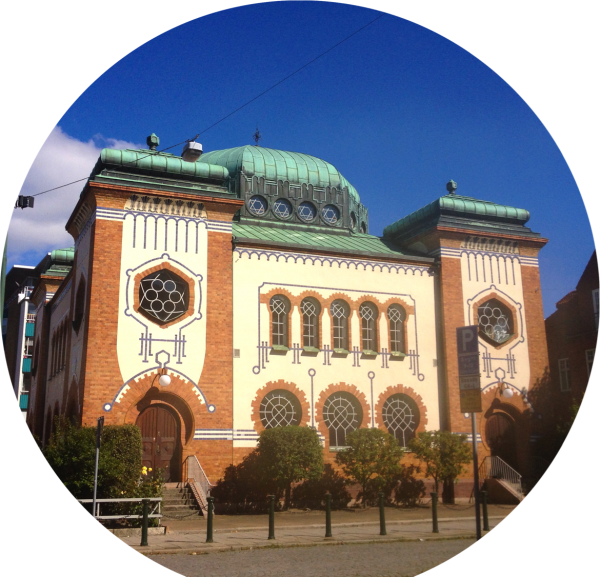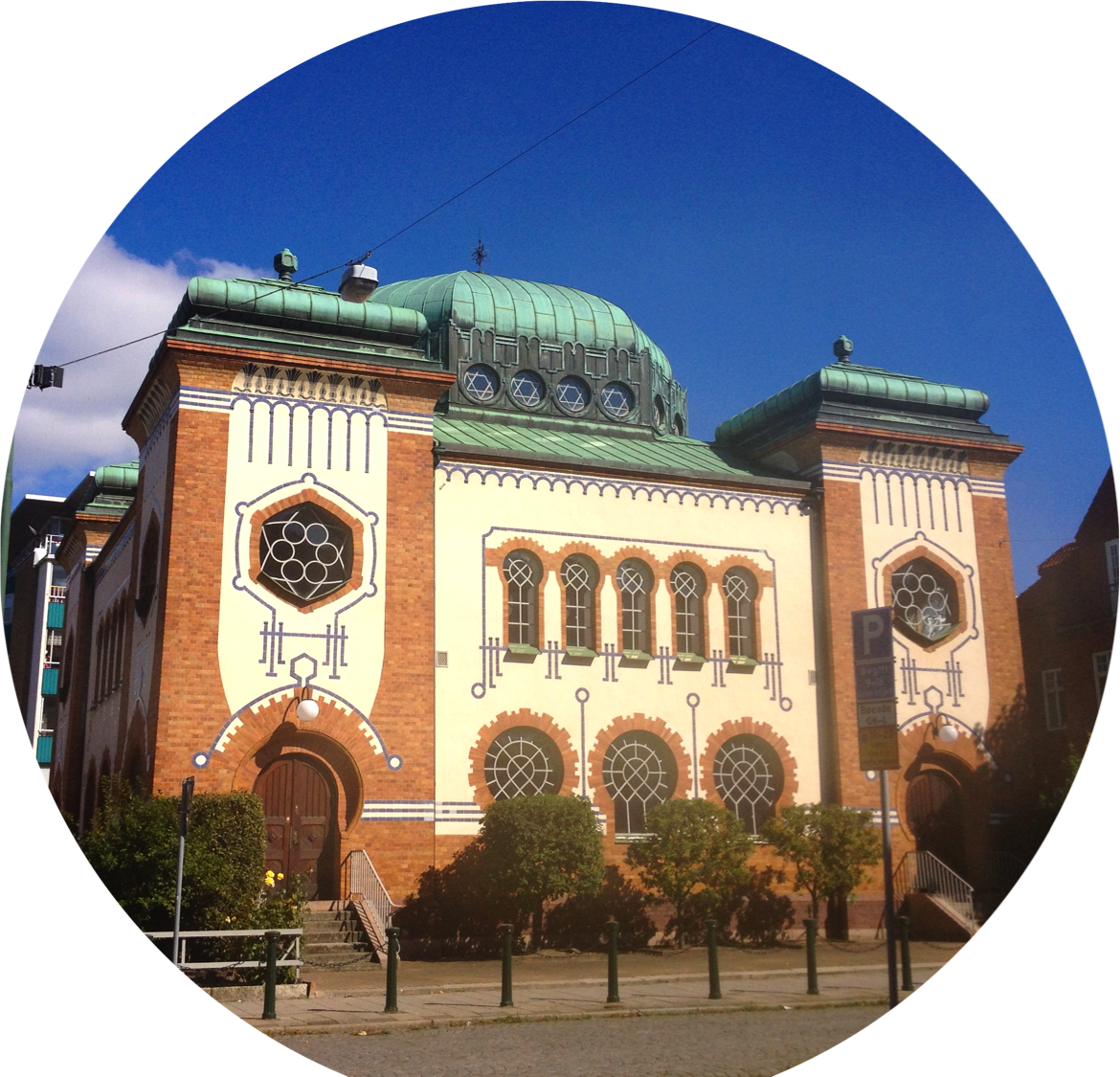
On June 9 in Malmö, Sweden, 27 residents of the Rosengård neighborhood, infamous in Europe as a segregated ghetto of recent refugees, were arrested on charges of attempted murder as gunfire was heard through the city streets. Three days later, on June 12, two men were injured in a bomb explosion near the Skåne University hospital. On June 20, two hand grenades were thrown at an apartment block.
Malmö, with its changing demographics, has become famous for its introduction of high crime rates and gang-related violence in Sweden’s southern region. For the Malmö Jewish community, the increase in supporters of Palestine, violence, and Swedish right-wing xenophobia makes for a scary combination.
On one hand, these drip-drops of disrespect are felt intermittently in Malmö’s Swedish-Jewish community. Many established families are now considering moving to Stockholm, America, or Israel in search of security and acceptance.
Swedish parents or grandparents are more eager to see their children eventually move away from Sweden in order to live a truly Jewish lifestyle. Agnes, a 65-year-old grandmother to the children of her Jewish son and his Christian wife, said Jewish life in Sweden is like a soup — “slowly getting watered down over the years.”
On the other hand, Sweden and the world are now paying close attention to the status of Jews in Malmö. President Obama addressed the anti-Semitism in the city directly during a visit in September 2013. In March of this year, Obama sent Ira Forman, the U.S. special envoy of the Office to Monitor and Combat Anti-Semitism, to analyze Malmö’s progress facing rising threats to its Jewish community.
Sweden’s own press is also highlighting increasing anti-Semitism in Malmö. On January 21 of this year, Sweden’s national public broadcaster, SVT, released an hour special on anti-Semitism in Malmö. It featured interviews with municipal authorities about the actions the city is taking to ameliorate the situation. Malmö’s Chabad rabbi talked about walking the streets and getting glass bottles thrown at his head. A Swedish journalist walked around the city with a kippa and a magen david necklace, and heard rude comments about Jews and Israel in certain sections of the city. Sweden has also had extensive press coverage and numerous events centered around Siavosh Derakhti, the 23-year-old Turkish-Azerbaijani-Swedish founder of Young Muslims Against Anti-Semitism.
With the world’s spotlight on Malmö’s Jews, this article will make three observations about the community. The first is that the Malmö Jewish community is unprepared for foreigners.
There are three ways in which Malmö’s Swedish-Jewish community is unprepared for foreigners. First, there’s a distinct lack of information available in English. Second, the high security measures make it incredibly difficult for outsiders to reach out to the community. Third, the community is understaffed, with low financial resources, and thus doesn’t have many personnel who can work towards public outreach. All of these factors combine to have a negative effect on the one local synagogue and the small Jewish community center (JCC): they are cold, dark, empty places that are always closed when you walk by.
These three factors lead to situations where people who want to connect with the community but aren’t Swedish are often left behind. For example, the internal website for the Malmö Jewish community is only in Swedish and needs a password to be accessed. Even virtually, the community is not open for everybody. In addition, there is no community “front desk,” as the doors to the JCC are locked at all times and it’s impossible to enter the building without a passcode or personal assistance. Moreover, there is a high fee — one percent of your annual income — that comes with joining this community, which begets exclusion for short-term and foreign visitors.
The concern for security also hinders the openness of the Malmö Jewish community, as it has to finance not only personnel but also guards to be present during working hours. Furthermore, accepting short-term or foreign visitors would be arduous, since there would have to be a vetting process that would take time and resources away from Swedish members of the community. The English language information is costly as well, because translators and programmers would have to be hired to make English language promotional and virtual material. Overall, financial constraints and security concerns limit the Malmö Jewish community’s ability to incorporate outsiders.
The second distinction of the Malmö Jewish community is its strong support for Israel. Jews in Sweden are often, and increasingly, linked to Israel. Malmö has a particular resonance with this relationship due to the changing demographic of the city. As more recent immigrants from the Middle East are provided refuge in the city, the more intolerance Malmö’s Jews face in connection with the Palestinian-Israeli peace process. In 2014, Sweden was the first European Union member in Western Europe to officially recognize the state of Palestine. The media coverage in Sweden is skewed towards pro-Palestinian arguments, and the BDS movement is strong there as well. Consequently, Swedish Jews feel that they are the only potential pro-Israeli voice in Sweden and thus grow stauncher in their convictions. This cycle dampens democratic debate both within the Swedish-Jewish community — it’s hard to not be supportive of Israel in such a threatening environment, but also in Sweden in general, where people are less open to the Israeli political narrative. This internal struggle rings strong for the Malmö Jews.
Third, Malmö’s Jews, and in general the Jews of Sweden, are sometimes more culturally Swedish than the Swedes themselves. Jews have a long history in Sweden, with the first Jew having settled there in 1775. While there was an influx of Jews during and after WWII, these Jews have assimilated easily and quickly.
“We were the only foreign people around in Sweden at that time,” said Avi*, 56, whose parents were Holocaust survivors and came to Sweden from Belarus.
“We felt conspicuous until the late 60s with our dark hair and dark eyes.”
Perhaps with this divide so clearly painted for them, the Swedish-Jews felt intense pressure to prove their “Swedishness,” love for Swedish culture, and traditions. Or perhaps with Jews’ affection for their new home, which had accepted them at times that others wouldn’t, genuine care sprouted for this Scandinavian haven. Either way, the Jews of Sweden may now be even more characteristic of Swedes than the Swedes themselves.
Swedish culture is shaped by its egalitarian outlook, disapproval of boasting, and affection for moderation rather than extremes. Being on time, dressing well, polite table manners, and personal hand-written thank you notes are all essential when visiting a Swedish family home. Privacy is also a principle to be respected, as one would never ask for a tour of the house, bring up personal details in conversation, or invade someone’s personal space. These are all mannerisms that the Swedish-Jews have taken to heart. Walking into their home is exactly like any other home in Sweden.
Swedish-Jews are largely comfortable with their Swedish identity. What’s important to them is that hyphenation: that they are recognized as both completely Swedish and Jewish, to whatever religious or cultural extent. For every minority in every country, finding this balance is extremely difficult.
Henri*, 57, suggested that balance is still hard to maintain.
“I am not one of those burning Zionists, but I still question if there will be any Jews left in Sweden in the imminent future,” he said.
* Names have been changed to protect anonymity.
Doreen El-Roeiy is a Fulbright Scholar studying at the Raoul Wallenberg Institute of Human Rights and Humanitarian Law at Lund University, Sweden.

